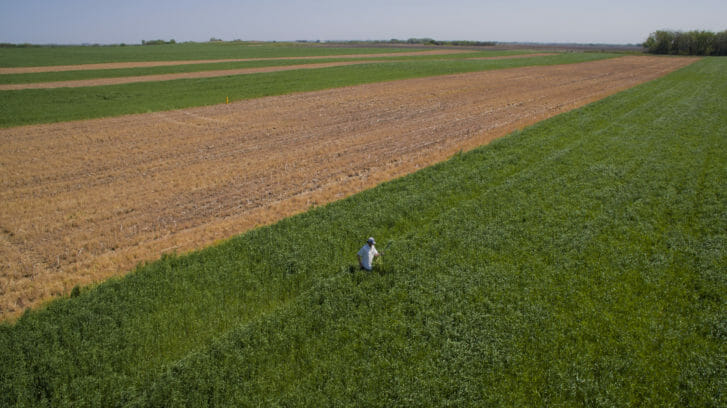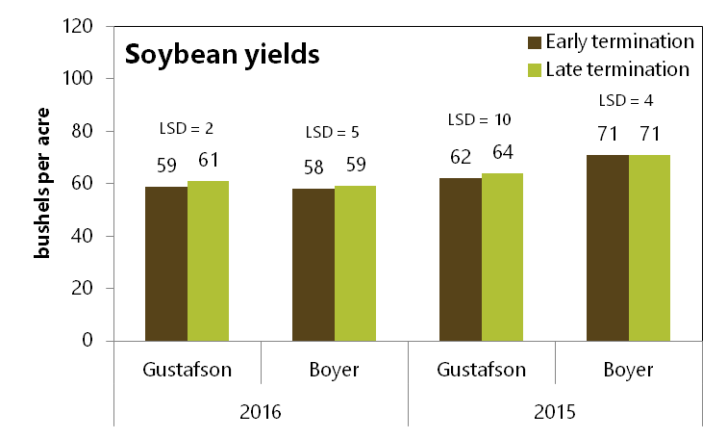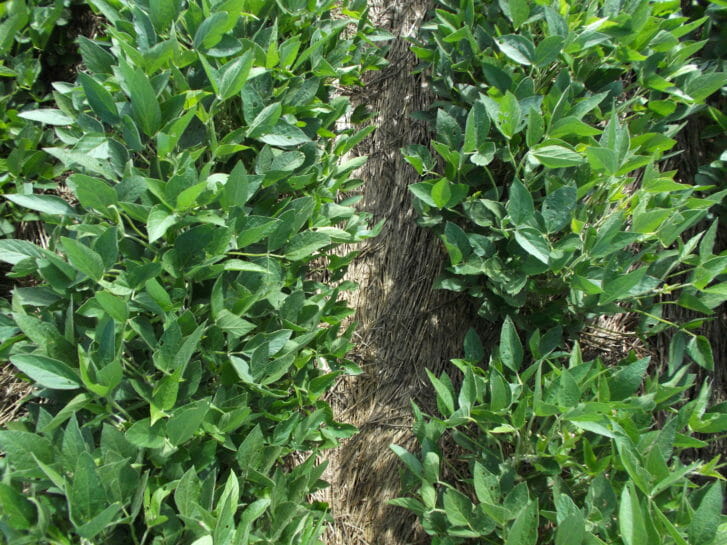RESEARCH REPORT: Cereal Rye Cover Crop Termination Date Ahead of Soybeans, 2016 Update

Randomized and replicated strips of the early and late termination treatments at Jeremy Gustafson’s on May 6, 2016. Jeremy planted soybeans into these strips on May 7. Photo courtesy of Dean Houghton, The Furrow.
Delaying cover crop termination until near soybean planting would allow for more biomass production by the cover crop in the spring presenting the opportunity for more environmental benefit. Two farmer-cooperators continued work they began in 2015 that compares terminating a cereal rye cover crop 2-3 weeks prior to seeding soybeans (early termination) with terminating the cover crop within 5 days of seeding soybeans (late termination).
The objective of this research project was to quantify the agronomic performance of soybeans when delaying cover crop termination to within five days of seeding the soybeans. Jeremy Gustafson hopes that more people will be comfortable planting soybeans into a thick stand of recently terminated cereal rye. In doing the trial for the second time, Jack Boyer wondered if he can reap the same weed control benefits he observed in 2015.
You can read the full report here: Cereal Rye Cover Crop Termination Date Ahead of Soybeans, 2016 Update.
This research project was conducted by Jeremy Gustafson near Boone in Boone County and Jack Boyer near Reinbeck in Tama County in 2016 and 2015.
Both cooperators followed corn (Boyer followed seed corn in 2015). By farm, soybeans were seeded on the same date following two cereal rye cover crop termination dates: approx. 2 weeks prior to soybean seeding (early termination) and within 5 days of soybean seeding (late termination). The design of these trials was a randomized complete block with each of the two treatments in strips running the length of the field at each farm.
Key Findings:
- Jeremy Gustafson saw a 2 bu/ac increase and improved weed control with the late termination treatment in 2016. This amounted to a $49.97/ac economic benefit compared to the early termination treatment. In 2015, soybean yields were equivalent between the two termination date treatments.
- Jack Boyer saw no difference in soybean yields between the two cover crop termination treatments in either year. In 2015, he was able to skip a post-emergence herbicide application which saved him approx. $40/ac.

Soybean yields for the early and late cover crop termination treatments at Jeremy Gustafson’s and Jack Boyer’s in 2016 and 2015. The least significant difference (LSD) at the P ≤ 0.05 level is indicated above each pair of mean columns for both years. By year and farm, if the difference between the treatment means is equal to or greater than the LSD, the treatments are considered significantly different.

Mid-season “mulch” at Jeremy Gustafson’s on Aug. 6, 2016. Jeremy was able to eliminate two weed control passes in the late termination treatment.
For more details on this project, read the full report here: Cereal Rye Cover Crop Termination Date Ahead of Soybeans, 2016 Update.
This project is supported in part by the Walton Family Foundation and the Iowa Department of Agriculture and Land Stewardship, Division of Soil Conservation.
For more information about this study and other studies as part of PFI’s Cooperators’ Program, contact Stefan Gailans at stefan@practicalfarmers.org.
